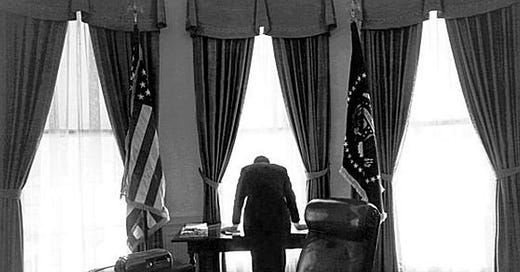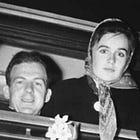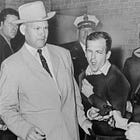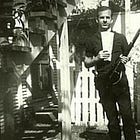Well, the 2024 election has come and gone, and Trump is the victor. Next comes the gradual disillusionment of the Trump supporters who still believe that he will dismantle the deep state and frustrate the implementation of technocracy. While I am open to the possibility that Trump has experienced a meaningful change of heart and perspective, I am not expecting or hoping for this. I suggest this quick summary with links to lay out the likelihood that he will continue in service of the ruling oligarchy. I’m grateful someone else did the work of laying that all out so I don’t have to. My disillusionment tells me that sooner or later, RFK will be pushed to the side of policy-making relevance in the Trump Administration and will eventually resign “to spend more time with his family.” Excuses will be made for this, followed by a “Look over there!” distraction while Trump cozies up with his backers: the technocrats exploiting his movement from a technopopulist angle, in opposition to the Democrats’ technoelitist angle.
Blue or red, populist or elitist, technocracy is what we will get with establishment politics. I am open and willing to be pleasantly surprised to the contrary. In the meantime, my greatest hopes for Trump’s victory is that it will initiate the disillusionment of his supporters while also initiating the disillusionment of Democratic Party supporters. Please refer to my article on the Great Disillusionment for details on why this would be a positive development. The Blue Team is now left to make some sense of the approaches and policies they have supported so far in the 2020s (medical tyranny, lawfare, censorship, war, and general arrogance). I hope some of them will recognize that the bankruptcy of those approaches and policies have swept them from power. Perhaps some of them will be able to remember what they once stood for: freedom of speech and conscience, civil liberties, material support for the middle and working classes, and peace.
2024 was the first presidential election year since 1984 in which I did not once tune into the media to see how it was going or who would win. It felt wonderful to be free of the emotional burden of caring who would win, and waiting until the following day for someone in my personal life to tell me what the results were. I hope Trump keeps his word about finally releasing the entirety of the still-classified Kennedy assassination documents, but I will not be surprised if more excuses are made to justify their continued classification, followed by another “Look over there!” distraction to bury the issue from public consciousness.
More than simply releasing the illegally classified and redacted files the US government is sitting on like a dragon, a real leader would take affirmative steps to divulge the truth about the assination to the American people and the world. For instance, three key witnesses are still living today who have been withholding the full truth since 1963: Ruth Paine, Marina Oswald Porter, and Buell Wesley Frazier. They are all in their 80s and 90s, and won’t survive much longer. I will explain in my series of articles why I am convinced beyond a reasonable doubt that each of them, for their own reasons, provided false testimony on the assassination, contributing to the cover-up.
I would love to see a public reckoning wherein these three figures (and any other surviving witnesses I am missing) were offered full immunity from liability and prosecution for their part in falsifying evidence. Perhaps nothing would ever get them to come clean about this—to fully share everything else they know about the case that has remained hidden. But public pressure, coupled with public forgiveness and legal protection might induce them to clear their consciences. May each of them leave this world at peace in their hearts when their times come. The truth would bring healing to each of their souls, and to the rest of the world.
In that spirit, I now turn to my series of articles about the assassination of the last US President who truly mattered, JFK.
“How dare you say that?” I hear some of you asking. “It may not matter to you, but real policies and real wars flow from the question of who is president, and that matters deeply to millions upon millions of people affected by them in the past 60 years.” I don’t dispute that, but in my analysis, every presidential administration since Kennedy’s removal from power has answered to what we may loosely refer to as the deep state: the network of oligarchs, military leaders, and intelligence agencies who have held sway over every president since 1963. They hold the true power in America and in her government, institutions, corporate media complex, and (to the extent that the public fails to recognize their stranglehold on power) American society itself. Through 60 years of power changing hands between Republicans and Democrats, the Deep State Oligarchy has steered America exactly where it wants to lead us—and nowhere else.
Recognizing and confirming this fact is the ultimate goal and purpose of studying the Kennedy assassination. But this study offers other benefits as well. It may come as a surprise to those who have never dived into the wild and woolly world of Kennedy Assassination Research, but the this particular diving practice offers the potential for significant restorative and strengthening boons to the mind, heart, and soul.
Balm for the Soul in Reaching Clarity on the JFK Case
As mentioned in the conclusion of my November, 2024 article, Swimming in the Ocean of Lies, The JFK Assassination benefits from an abundance of research, evidence, and information. While many aspects of the case remain shrouded in mystery, many aspects of the case are eminently discernible. This evidence and research makes it possible to pick apart the official narrative and cover-up fed to the public since 1963, dismantle it, and reclaim truth from the web of deceptions and labyrinth of misdirection surrounding this case since its inception. In our current benighted Age of Nothing Is Real, the clarity available to us through study of the Kennedy Assassination is tonic for the spirit.
Through the process of this study, we are able to learn much about the true workings of power in the United States, not only in the 1960s, but ever since. The history of the past 60 years becomes orderly, understandable, and predictable. The purposes, execution, and consequences of the Deep Political Events (to use a phrase I learned from the venerable Peter Dale Scott in the course of my research) that occurred in recent decades become readily accessible. From the Gulf of Tonkin, to the MLK and RFK assassinations, to Watergate and Iran Contra, 911 and the War on Terror, all the way up to Covid-19 and beyond—familiarity with the JFK Assassination is like a key that unlocks the doors of understanding in every instance.
Along the way, the discipline of reasoning one’s way through the morass of false leads, limited hangouts, disinfo dumps, tampered evidence, chaos agents, hucksters, cover-up artists, salacious narratives, and official obfuscations that characterize Kennedy Assassination research is invaluable training for the sharpening of the critical mind. I can think of no better subject of study for the furtherance of critical reasoning skills than the process of examining the evidence of what happened in Dallas on November 22, 1963, considering possibilities, eliminating impossibilities, holding competing narratives and reality maps in one’s mind, and putting these to the test in terms of contextual integrity. Studying the hall of mirrors surrounding the life, deeds, and character of Lee Harvey Oswald, the parapolitical keepers of power in the military and intelligence agencies of the 1960s, and the realpolitik agendas behind them tests and refines the mind in countless ways, redounding to the benefit of the faithful student.
True, the JFK Assassination also offers the opportunity to get lost in fantastical silliness and sweeping flights of whimsy and speculation. These side trips can be enjoyable diversions, or they can represent perilous bogs of false certainty and narrative dogmatism for the careless traveler. Such pitfalls are an essential part of the journey, though. By wading through them, we realize that only our own commitment to truth and humility regarding our level of certainty can guide us. Each of us alone is responsible for our own integrity in terms of what we choose to believe or disbelieve. What facts do we accept without proper justification? What facts do we dismiss without proper justification? What narratives are we wedded to that cloud and twist our reasoning and discernment? What hidden motivations and emotional needs steer us toward truths we’d rather believe, and away from truths we’d rather remain ignorant of? The Kennedy Assassination case is a patient teacher that helps us understand ourselves, our biases, our intellectual laziness or integrity, and our reactivity—if we let it.
By staying true to the process, we are rewarded with increased clarity and understanding about how our world has been shaped, and about the forces and powers shaping it. But the discernment skills we stand to gain through this discipline have greater application than teaching us about history, politics, and power. They can also assist us in strengthening our immunity to present-day media manipulations, psyops, and propaganda, and even assist us in undoing gaslighting wounds and resolving prevalent deceptions and hidden power dynamics in our personal lives.
That said, taking on the enormous task of studiously scrutinizing the Kennedy Assassination is not a task for everyone. Few of us are so captured by the allure of the case to devote the years of engagement necessary to explore every nook and cranny of the subject. Indeed, the wealth of material available to sort through makes this a discipline with the potential to continue on throughout any person’s lifespan, with corners still unexplored at the time of death. Even today, over 60 years since Kennedy’s murder, new evidence and information continues to emerge. The US government continues to jealously guard classified documents related to the case, seven years after the date stipulated by an Act of Congress for their full release. A handful of researchers have devoted their lives to the pursuit of the truth in the Kennedy Assassination, and continue in their efforts as we speak.
It is due to the devotion of these researchers that today a very good picture is available to us of what did and didn’t happen on November 22, 1963. We have a very good picture of the background and events that led to the success of the assassination; we have a very good picture of how the cover-up was executed and directed; and we have a very good picture of who the responsible parties were, what their motives were, and the consequences of their success. I will provide lists and links to the names of researchers, books, podcasts and other resources at the end of each article in my series for those who would like to learn more for themselves. However, for the most part, I will not be providing itemized citations for what I pass along to my readers in these articles.
This approach is a function of the limitations of this project, which is not meant to be a substitute for the many examples of excellent research available in the case. I am not attempting to join the ranks of the great researchers in this case; to do so would require me to write an entire book (or several) of my own, which would take several more years of research and devotion to complete. There are already many great books available that validate and expand upon the information I’ll be presenting here. And so I urge readers not to simply take my word for what I share, but to at least read one book, engage with one podcast, and/or view one documentary on the case for themselves and engage in the pursuit of truth personally.
I have several objectives in mind by writing this series of articles:
First, I wish to demonstrate how the facts of the case can be worked with and reasoned with to hone the process of critical reasoning itself, and its application to this case as well as other subjects of controversy. I have identified a number of generally applicable tools and pitfalls of reasoning over the course of ten months of obsessive interest in this case. I wish to assist my readers in sharpening their own discernment abilities by sharing and demonstrating these tools and pitfalls.
Second, I wish to offer my readers the benefit of my own studies and exploration to provide a framework by which to approach the case—to highlight areas of evidence worth focusing on, areas to proceed with caution, areas that lead to dead ends, and areas to avoid entirely.
Third, I wish to map out what I believe can be known and understood regarding this case with a high degree of certainty, how I got there, and what implications these understandings lead to. This will provide a map of the case that I believe will be of high utility for those who wish to use this map as a guide for their own research. For those who do not go on to research the case independently, they can compare my map of the case and its implications to whatever they have heard or read elsewhere. Every step of the way, I will explain my reasoning and truth-sorting process. I believe that will make my take on the case quite valuable.
Fourth, through this case, I wish to explore what Gandhi referred to as “experiments in truth.” I learned about Gandhi’s expression of this concept in the JFK Assassination book I most highly recommend: JFK and the Unspeakable by Jim Douglass. It highlights the spiritual and philosophical importance of the many experiments with truth offered by the JFK assassination case. This experimentation has reinforced a number of important values for me. In particular, I have recognized how the allure of narrative has led to false conclusions about two important figures in the case in particular: John Kennedy and Lee Harvey Oswald. Both figures have been subject to character assassination as well as physical assassination due to the cynical motives of opportunists seeking power, and due to callous and lazy conclusion-jumping by many who forget that both men were real people.
In the case of Kennedy, the implications of his life, his aims, and what he stood for have far-reaching implications on history and our understanding of it. In the case of Oswald, understanding the true nature of his character and life has almost no bearing on history. Indeed, it has limited bearing on understanding what we need to know about the assassination itself. But Oswald has been reduced to a cipher, a pawn used by others to mold an image of him, usually as a scapegoat, to fit neatly into the narrative they wish to tell. Over time, it has saddened me to hear so many people declare Oswald to be guilty of shooting Kennedy, and/or JD Tippit, or to be involved in the assassination as a plotter without being a shooter, without strong evidence to back these claims up, and with a degree of flippancy in simply declaring their beliefs about the role he played. Through the example of Oswald, I would like to demonstrate the spiritual importance in honoring every human being on this earth for the divine souls they truly are. This experiment in truth awakens our compassion, our empathy, and our own humanity. It promises to liberate our own souls, as well as the souls of those who may have been falsely accused.Finally, as a further experiment in truth, I wish to demonstrate how weird our world truly is. Many of us seek narratives to explain our world in the most banal, simplified manner possible. Most of us have heard of Occam’s Razor, which urges us to adopt the simplest explanation as the one that is most likely true. But we do a disservice to truth if we believe the explanation that seems simplest to us must necessarily be true. This is an instance of one of the reasoning pitfalls I will be highlighting in this series of articles: I call it narrative frontloading. With narrative frontloading, we arrive at an idea of how we think the world really works, latch onto it, and then try to cram the facts and evidence into our narrative to make them fit. Through this process, we are liable to ignore and dismiss contradicting facts and evidence, compartmentalize contextual inconsistencies in our narrative, and created a skewed, distorted version of the truth in the process.
I have found that we are much better served by letting the world teach us what is true—to be continual students, always learning more about what is true, always ready to modify our beliefs and guesses about what is true when the world shows us more than what we previously knew. The Kennedy Assassination is an excellent teacher in this regard. Through true intellectual rigor, policed only by our own honesty with ourselves and our process, we will uncover hidden wilds and wonders we never would have guessed were true—or even that they could be true.
Through our devotion to collecting facts, analyzing them in terms of their veracity by various tests and means, eliminating impossibilities, and allowing the winnowing of what is possible to guide and shape our understanding, this wild and wondrous world reveals itself to us. We learn that the world we live in is far darker than perhaps we had guessed. We uncover unimagined evils, but we also uncover astounding occurrences, rich tapestries of beauty and humanity, and an amazing weirdness in the world that surprises us and brings us back in touch with the state of innocence and wonder we once knew as children. Now, as then, the world is full of abundant magic and surprises to delight as well as terrify. The world evokes our love, our sorrow, and our care when we allow it to teach us.
I’m excited to share with you the weird and wild wonders I’ve discovered—as well as the calm restorative peace of clarity the JFK Assassination has brought to me. This case is like a Rosetta Stone that helps us read the world—if we let it. The outcome depends on each one of us. We can treat the truth cynically, as an object to be purposefully twisted and distorted in the furtherance of our own ambition. We can treat the truth with lazy disregard, weaving fabrics of reality that suit our own needs for emotional comfort or entertainment. And we can treat the truth as a malleable, unexplored, insubstantial tissue that allows us to go along to get along—and not be troubled by the need for courage, integrity, or strength of character.
Or we can approach the truth as a guide, a teacher, a discipline, and a focus of our devotion. We can feel the call to truth in our hearts, and answer the call, not knowing the realms and realities it will take us to. But we know in our hearts that Love is the Truth, that we can Trust in Love, and we can Trust in Truth. Truth, Trust, and Love are one. There is no better place or direction we can long for.
Relendra’s series of Kennedy Assassination Articles
While it is outside the scope of this series of articles to provide footnotes or citations for much of the evidence presented here, I have compiled a resource guide to encourage readers to verify the facts of the case for themselves: a compendium of the books, websites, podcasts, films, and methods of research available in researching or learning about the Kennedy case, complete with links.
An intro to the discipline and benefits of understanding the assassination of John F. Kennedy—with reference to its utility and applicability in understanding power dynamics and narrative reasoning on the macro scale of history and global politics, now and then, as well as in one’s personal relationships and spiritual journey.
An introduction to three images that open the mind to the Kennedy Assassination—and a guide to the process of encountering the doors of perception and the keys that unlock them.
A deeper exploration of the path beyond the initial doorways of the Kennedy case through narrative frame comparison, guidance in the use of narrative reasoning tools, and identification of reasoning pitfalls and narrative fallacies. The backyard photos and the circumstances surrounding them are held to particular scrutiny. The case for seriously questioning the official narrative of the assassination is firmly established.
An exploration of the medical and ballistic evidence in the Kennedy Assassination, using narrative frame comparison to eliminate impossibilities in two competing narrative frames: Kennedy was assassinated by a single gunman, or Kennedy was assassinated by multiple gunmen.
In continuing the process of eliminating impossibilities through narrative frame comparison, the evidence against Lee Harvey Oswald is examined in detail. Through this examination, the exoneration of Oswald is established. Oswald did not fire any shots at Kennedy, nor did he participate in the assassination. Multiple gunmen fired at Kennedy, but Oswald was not one of them.
Two men, Ralph Yates and Buell Frazier, both testified to transporting Lee Harvey Oswald to the Texas School Book Depository—and that Oswald bore a package with him he described as containing curtain rods. In examining the reports of both men through narrative frame comparison, it can be established that Yates did transport a hitchhiker claiming to carry curtain rods, but it wasn’t Oswald; and Frazier did transport Oswald, but Oswald didn’t carry a curtain rods package. The intersection of these stories provides strong evidence that Oswald was framed for Kennedy’s Assassination prior to its occurrence and that members Dallas Police Department assisted in framing Oswald, possessing foreknowledge of the plot.
A glossary of terms to aid in the process of contextual narrative reasoning. Includes descriptions of narrative fallacies and narrative reasoning tools, with examples and application to the Kennedy assassination case













Deeply fascinating.. I find it beautiful how meticulous you are. The care is palpable and is touching..
Looking forward to the next installments in this series 🙏
PS. Regarding search engines (for research), this article reviewing the different options today might be of some value https://swprs.org/internet-search-and-artificial-intelligence/
Might be worthwhile to perhaps also look into non-american search engines to avoid the bias and massive censorship of the american national security state on the american engines. I personally like Yamdex (russian) and etools (swiss) to discover things that the american engines hide..